Key takeaways:
- Pro-life advocacy is deeply personal, driven by individual stories and collective experiences that highlight the value of every human life.
- Legislative sessions serve as vital platforms for discussion, allowing grassroots activism to elevate pro-life voices and foster community solidarity.
- Key issues in pro-life debates include the definition of personhood, access to resources for women, and the promotion of adoption as an alternative to abortion.
- Future trends in pro-life legislation emphasize comprehensive family support, integration of pro-life principles in healthcare reform, and innovative grassroots legislative initiatives.
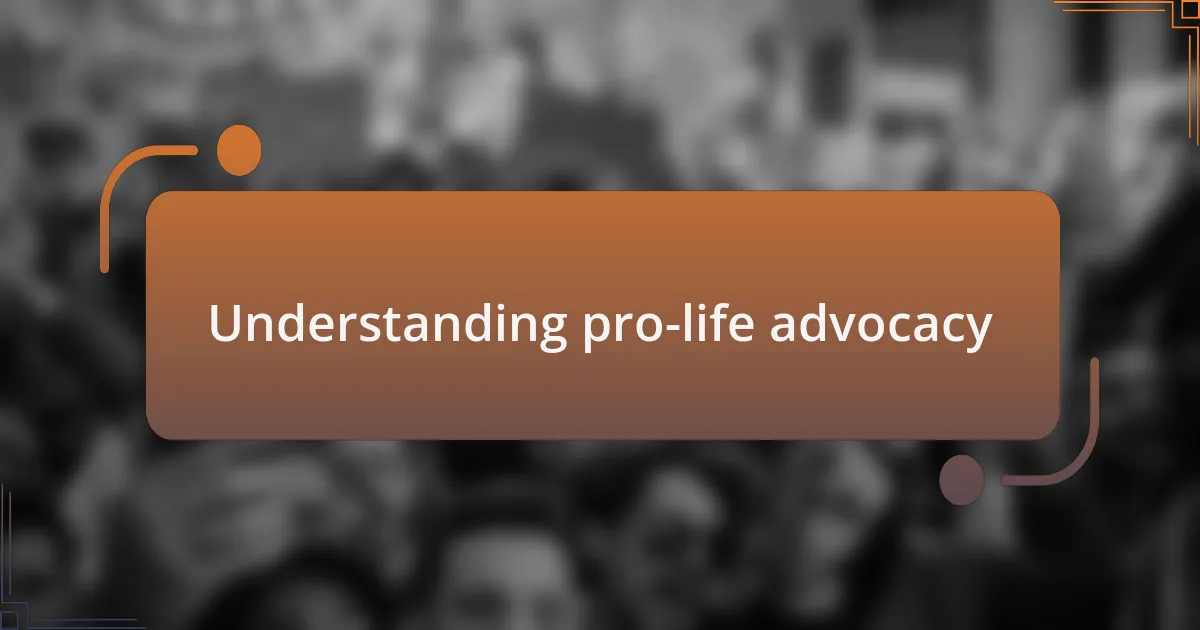
Understanding pro-life advocacy
Pro-life advocacy is rooted in the belief that every human life, from conception to natural death, has inherent value. I still remember attending a local advocacy meeting where a mother shared her story about choosing life for her child despite overwhelming pressure to terminate the pregnancy. It struck me how personal and deeply emotional these decisions can be, often influenced by societal expectations, yet powerful in affirming life.
I find myself wondering: what compels individuals to stand up for pro-life values? For many, it’s about more than policy; it’s a heartfelt mission to protect the vulnerable. I’ve seen communities come together, driven by shared experiences, forming bonds that highlight the relationship between personal stories and collective action. This advocacy is often filled with compassion, empathy, and a desire to foster a culture that cherishes every life.
Understanding pro-life advocacy means recognizing its multifaceted nature. It intertwines ethical, philosophical, and theological dimensions, creating a rich tapestry of motivations that inspire people to act. I remember a lecture on the moral implications of life decisions that left an indelible mark on me. It emphasized that this isn’t just a political issue; it’s a deeply personal one, affecting individuals in myriad ways. Each story and each voice adds a layer to the pro-life movement, showcasing its complexity and the heartfelt convictions that drive it forward.
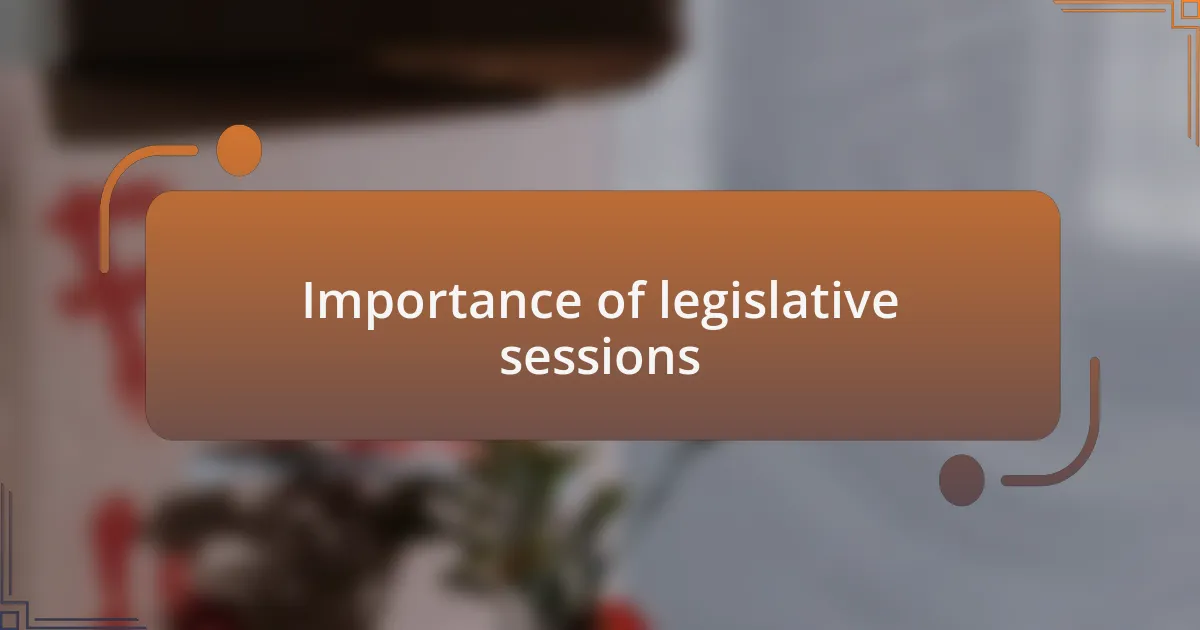
Importance of legislative sessions
Legislative sessions play a pivotal role in shaping the pro-life movement by providing a platform for discussion and debate around policies that affect the sanctity of life. I recall attending a session where passionate arguments were exchanged, highlighting the complexities of abortion laws. It became clear to me that these discussions are not just procedural but are tangible expressions of our values and beliefs about life.
Through legislative sessions, I have observed how grassroots activism can elevate the voices of those advocating for pro-life legislation. It’s inspiring to witness ordinary citizens, fueled by personal stories of struggle and hope, making their stand in front of lawmakers. This engagement is crucial; it bridges the gap between the legislative body and the people, ensuring that policy reflects the compassionate realities many face.
The importance of these sessions is underscored by their ability to foster community and solidarity among advocates. I remember an instance where people from diverse backgrounds united in support of a bill aimed at expanding resources for expectant mothers. This collective effort not only amplified our message but also reinforced my belief in the power of collaboration in advocating for life-affirming policies. How often do we find ourselves part of a movement that inspires change? Legislative sessions are an essential vehicle for that.
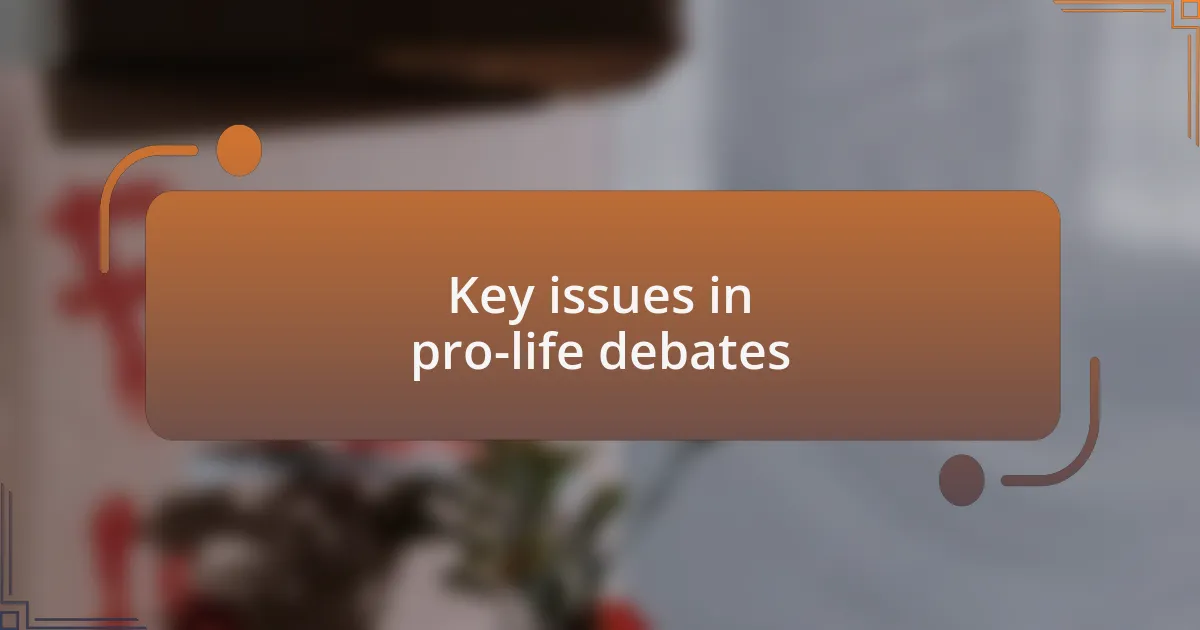
Key issues in pro-life debates
In my observations during legislative sessions, one of the most contentious issues is the definition of personhood. What does it truly mean to be considered a person with rights? I remember sitting in a heated discussion where lawmakers debated whether life begins at conception or at viability outside the womb. This question doesn’t just affect legal perspectives; it touches on deeply held beliefs and moral considerations that many grapple with. It made me reflect on how these definitions are not just legal terms, but resonate with families and individuals who hold their own experiences close.
Another critical issue that often emerges is access to resources for women facing unplanned pregnancies. I recall a poignant moment when a representative shared a story of a young woman who felt abandoned and overwhelmed. The conversation shifted from legal language to real-life implications, reinforcing the idea that pro-life advocacy extends beyond just opposing abortion—it’s also about creating an environment where women feel supported and empowered. Does the pro-life movement sufficiently address these needs? For many advocates, this integration of care and compassion is vital for fostering genuine change.
Finally, discussions surrounding the role of adoption in the pro-life framework are incredibly important. I’ve witnessed fierce debates about promoting adoption as a viable and loving alternative to abortion. During one session, I heard testimonies from individuals who were adopted, sharing how those choices changed their lives. It sparked a realization for me: the conversation around pro-life isn’t solely about laws; it’s about stories of love, resilience, and the many pathways to honoring life. Why do we often overlook these narratives in our discussions? It has left me pondering how we can better include these perspectives in shaping legislation.
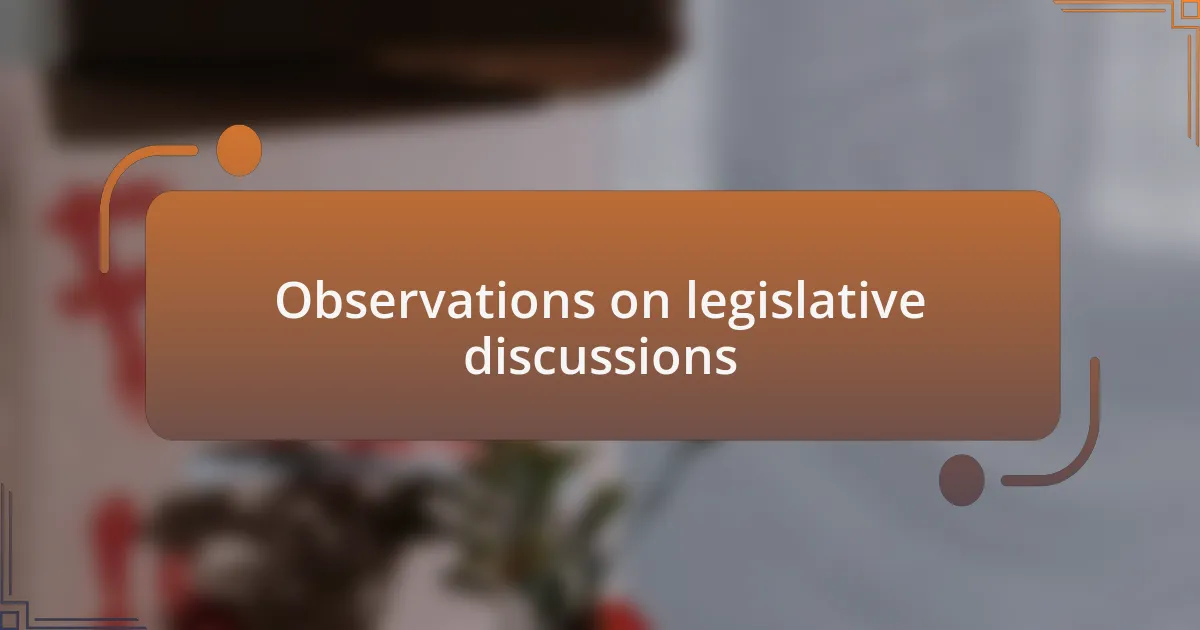
Observations on legislative discussions
During legislative sessions, I often find that emotions run high, particularly when lawmakers discuss the implications of abortion legislation. I recall one instance when a passionate advocate shared her own experience, recounting how her unexpected pregnancy transformed her life in ways she never anticipated. It struck me deeply; how often do we overlook the human stories behind the statistics? This emotional connection is essential, as it anchors the debate in real-life experiences rather than abstract principles.
I’ve also noticed how the discussion intertwines with issues of economic and social support for expectant mothers. As I listened to different perspectives, it became clear that many lawmakers emphasize the importance of adopting supportive policies, yet some struggle to recognize the urgency of this need. I found myself asking: Are we truly listening to the voices of those we aim to protect? The dialogue sometimes feels detached, which worries me because it’s the personal stories that can ignite change and inspire more comprehensive solutions.
Additionally, the role of education and outreach often surfaces in these conversations. I’ve seen representatives advocating for better resources to inform women about their options, and it resonates with me. I remember a session where a legislator passionately argued for increased funding for pregnancy support centers, sharing a story of a woman whose life was changed through the help she received. This not only highlights the responsibility we have towards women facing difficult choices but raises the question: Are we diligent enough in ensuring that women are aware of all their resources? Such reflections remind me of the broader vision of pro-life advocacy—it should encompass proactive support, aiming for a society that truly prioritizes life in all its forms.
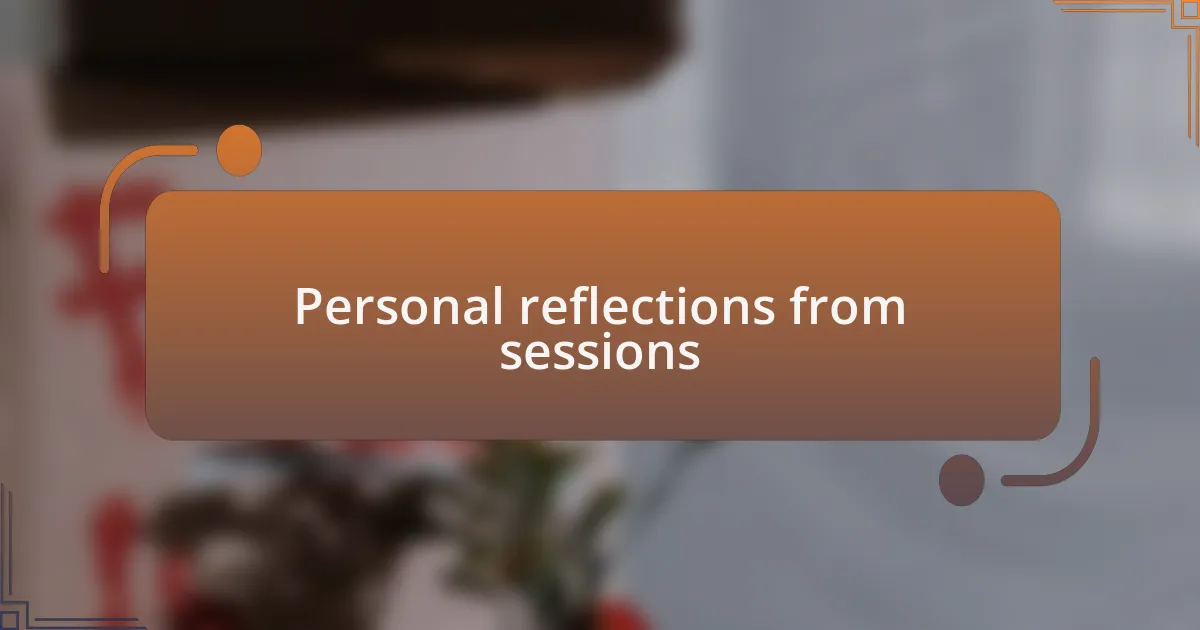
Personal reflections from sessions
As I sat through a particularly heated session, I found myself reflecting on the varying motivations that drive legislators. I remember one lawmaker revealing her own struggles with infertility and how that personal pain shaped her views on protecting life. In that moment, I thought about the profound impact our backgrounds have on our beliefs. It made me wonder—how often do we consider the personal journeys of those advocating for or against legislation?
Another striking moment came when a representative advocated for a nationwide mandatory counseling program for women considering abortion. Her voice trembled as she recounted the heart-wrenching story of a friend who felt lost and alone during her pregnancy. Listening to her, I couldn’t help but think: Are we doing enough to create an environment where women feel supported before they make such monumental decisions? It reinforced my belief that true advocacy goes beyond legislative wins; it incorporates compassion and genuine care for each individual’s situation.
During one session, a powerful exchange unfolded between lawmakers about pre- and post-natal care. A fellow advocate stood up and passionately spoke about her experience with inadequate support after giving birth. The anxiety she faced struck a chord with me; I thought about how systemic issues still leave many women vulnerable. It made me question whether we’re merely presenting a blanket solution without adequately addressing the diverse realities that women face. Reflection on these shared stories reveals a fundamental truth: advocacy should always involve listening and learning from the complexities of real lives.
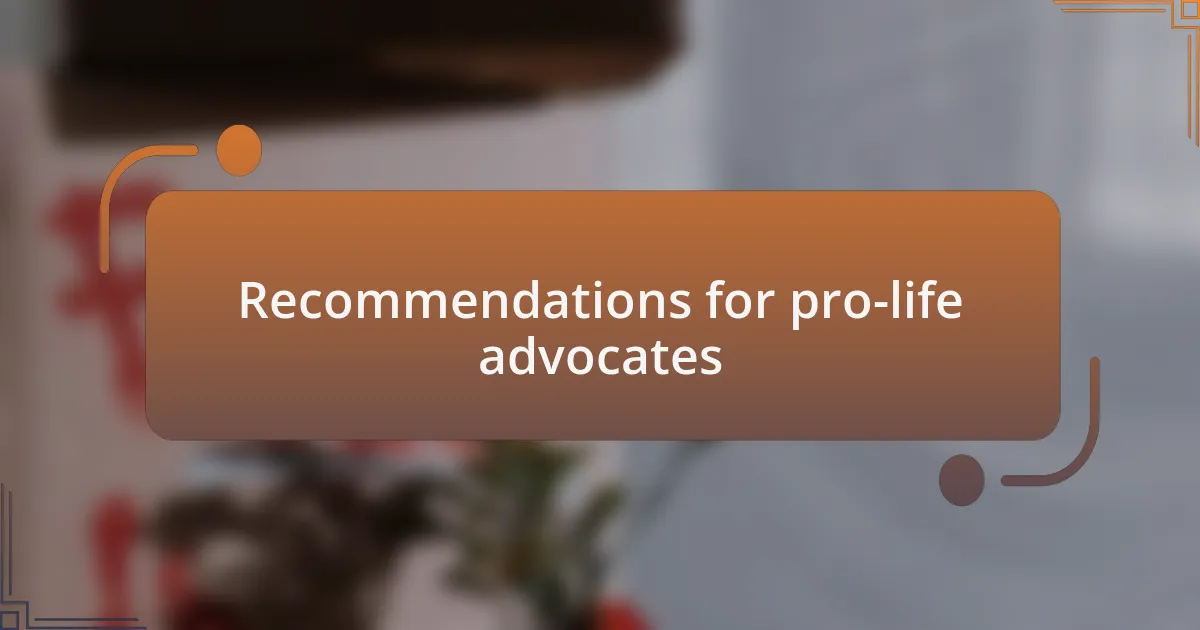
Recommendations for pro-life advocates
When it comes to advocating for pro-life policies, I recommend that advocates deeply engage with their communities. I once attended a town hall where a single mother shared her fear of raising a child without support. Listening to her story, it struck me how vital it is for us to understand personal narratives like hers. Have we considered reaching out to local organizations that provide assistance to women in crisis, allowing us to build trust and identify gaps in services?
Another suggestion I have is to create platforms for honest dialogue between opposing viewpoints. I remember a session where a fierce debate unfolded but also led to unexpected common ground on the importance of education about reproductive health. How often do we shy away from tough conversations that could foster understanding? Opening channels for discussion could transform polarizing debates into opportunities for collaboration and deeper empathy.
Lastly, I believe that advocacy should focus on comprehensive support systems, rather than just opposing abortion. I recall an interaction with a pro-life leader who emphasized the importance of mental health resources for expectant mothers. Reflecting on this, it made me ask: Are we doing enough to champion not just life, but the quality of life for women and families? By promoting a holistic approach, we can inspire change that resonates beyond legislation and genuinely uplifts the lives of those we aim to support.
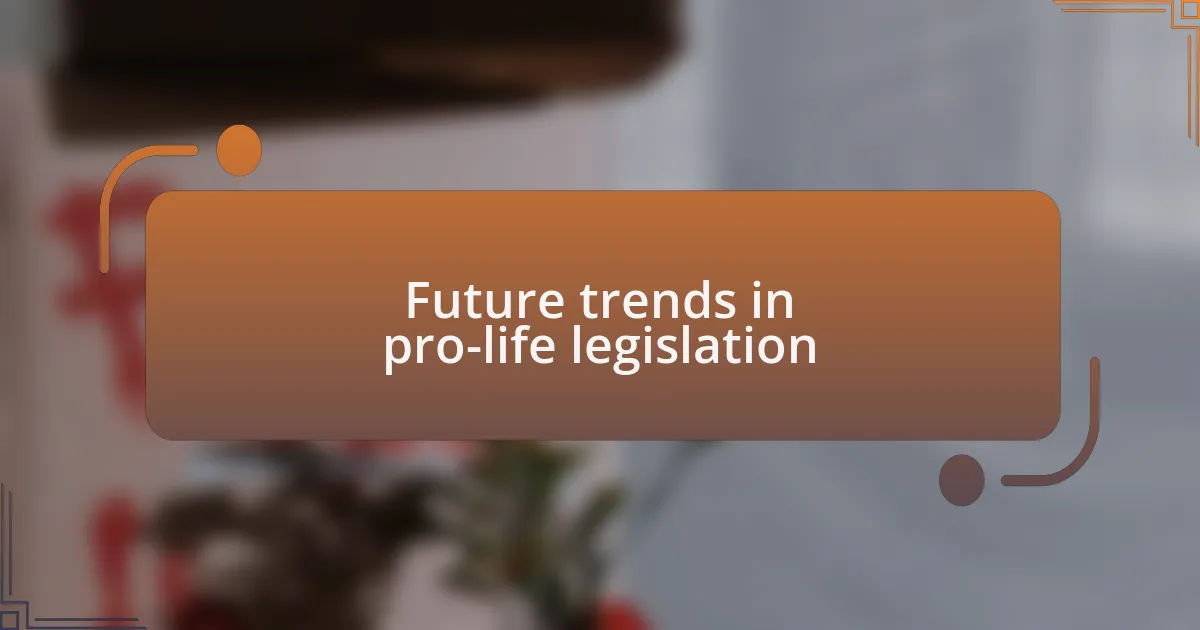
Future trends in pro-life legislation
As I observe legislative sessions, a significant trend I foresee in pro-life legislation is the increasing emphasis on comprehensive family support. In one session, I witnessed lawmakers rally around a package of benefits aimed at enhancing parental leave and childcare support. This shift underscores a growing recognition that protecting life extends beyond birth. How might prioritizing family well-being reshape the public’s perception of pro-life advocacy?
Additionally, I’m noticing a wave of interest in integrating pro-life principles into healthcare reform discussions. During a recent debate, several legislators highlighted the importance of providing accessible healthcare for pregnant women. They argued that ensuring proper prenatal care is a pro-life measure in itself. Could this blending of healthcare policy and pro-life values create a more holistic legislative approach that garners broader support?
Moreover, grassroots movements are paving the way for innovative legislative initiatives. I recall attending a rally where passionate advocates urged legislators to consider flexible adoption policies. They shared heartwarming stories of families that have excelled in open adoption arrangements. This approach may challenge traditional views on pro-life legislation and could inspire future laws that reflect the changing dynamics of family structures. Are we ready to embrace these transformative ideas in our advocacy efforts?